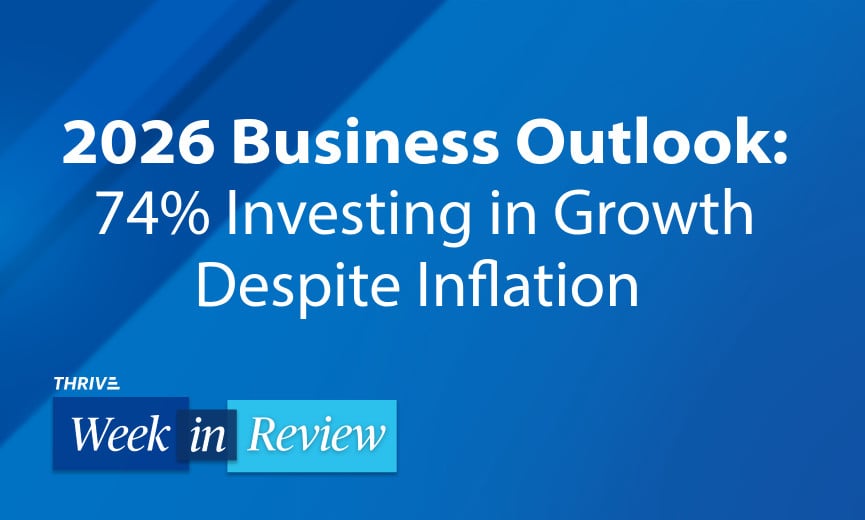- Thrive
-
Temporada
4Episodio82
Cómo afrontar los cambios en el salario mínimo, las estrategias de trabajo híbrido y los planes de compra de acciones para los empleados

Podcast •

Resumen
Join Gene Marks on the Paychex THRIVE Week in Review podcast as he discusses the imminent rise in minimum wages across multiple states, explores the complexities of hybrid work arrangements, and unveils the advantages of Employee Stock Ownership Plans. Gain insights into navigating these pivotal business changes.
Ver transcripción
[Gene Marks, host]
Hey, everybody, this is Gene Marks, and welcome to another episode of our weekly Paychex THRIVE Week in Review podcast. Thank you so much for joining me this week. This is the podcast where we go over some news that impacts your small business that just happened this weekend. A little thoughts and advice on what to do and how to handle that news. So let's get right to it.
The first bit of news has to do with minimum wages. Did you know that next year, starting January 1, 2024, the minimum wage in California is going to go up to $16 an hour? Now, California is not the only state that's raising minimum wages in 2024, a bunch of other states are doing the same.
Colorado's minimum wage is going to be going up as well as a District of Columbia, DC, as well as Hawaii, as well as Illinois, as well as Maine and Maryland and a bunch of other states that are increasing their minimum wages to anywhere between $10 and $16 an hour. Remember that the federal minimum wage is only $7.25 an hour.
Will we see a national minimum wage law that increases the federal minimum wage in 2024? I doubt it. It's quite the contentious issue, and I doubt that it's going to come up this year. But depending on how the elections go in November of 2024, we could be seeing the minimum wage go up even higher on a national level.
Some politicians, like Bernie Sanders, would like to see it go as high as $17 an hour nationally. I don't know if it's going to come to that level or not, but just be prepared. Check with your state if your minimum wage is going up and you're going to have to pay more next year. Just be aware. An increase in the minimum wage impacts all wages for hourly workers.
Why? Because if you've got an hourly worker making $15 or $16 an hour that's been working for you for a couple of years and the minimum wage goes up to $11 or $12 an hour, for example, in your state? Well, those workers are going to be looking for a commensurate increase as well. So just bear in mind that many, many states are having their minimum wages go up next year.
Google for your state, find out, talk to your payroll company, particularly if it's Paychex; see if that minimum wage is going up in your state in 2024 and how you should be preparing for it, because it will have an impact on wages across the board.
The second piece of news has to do with work from home. There is a new study that just came out from a company called Envoy, and this was reported on CNBC.com that found that a whopping 80% of bosses regret their initial return to office decisions and say they would have approached their plans differently if they had a better understanding of employees office attendance, their usage of office amenities
and other related factors. Many companies are realizing that they could have been a lot more measured in their approach rather than making big, bold, very controversial decisions based on executives’ opinions rather than employee data. That was Envoy's CEO Larry Gadea, who told CNBC just that. They interviewed more than 1,000 US company executives to come to those conclusions.
Yeah, I get it. What I'm seeing from most of my clients, if you're considering a work from home policy, people are doing hybrid work from home policies. You know, I don't see many cases where people are going completely virtual, and I'm really not seeing a lot of cases where companies are requiring that all employees have to come to work five days a week.
Most of the companies that I'm dealing with, most of my clients have come to some type of agreement based on their workforce where they're allowing their employees to work from home for a day, a week or two days a week. They're also doing it on a pilot basis to make sure that their employees are working well at home.
Some people don't like working from home. Others are working with, you know, letting their managers make the decision as to how often they want their people working from home. We're not. I mean, listen, if managers and their teams are getting their work done and they can do it on whatever basis they decide working from home or in the office, good for them.
The bottom line is, is that according to this survey, a lot of CEOs and leaders went at it a little too hard and demanding all their employees come back to work. You don't do that nowadays. Flexibility, work from home, four-day workweeks, all of that stuff. It's a big benefit and it's a big part of the workplace right now.
You've got to figure out what the balance is that's right for your company, but make sure that it's a balance and make sure that you take your employees thoughts and what their needs are into consideration.
The final bit of news this week has to do with employee stock ownership plans. Now, listen, these ESOPs have really been on the rise and I've seen a lot of clients adopting them over the past few years. I wrote two articles, one for the Philly Inquire and one for the Chicago Daily Herald, all about ESOP plans, where I interviewed dozens of CEOs and business owners who adopted ESOP plans in their businesses and they love them. ESOPs have unbelievable advantages. I mean, listen, with an ESOP, you basically create a separate entity from your company. That entity is owned by you and your employees, and that entity buys a piece of your company.
It doesn't have to buy 100%. It can buy like 20% of your company or 30% of your company. But what's amazing about that is that it gives you a bit of an exit out of your company because nobody pays for this. A bank finances it, so you get a check for the equity in your company. You don't have to find a buyer from somewhere. You've got them right there. It's your employees. And there are huge tax benefits for having ESOPs as well. When you pay the bank back, you get a deduction for both the principal and the interest. Whatever income that you are earning, that the ESOP that your company is earned, whatever income is allocated to the ESOP, it's tax free, which is amazing.
So there are some big tax benefits that you get from having an ESOP up in place. Plus, it's a great employee benefit to provide, particularly when all those millennials out there, the Gen Zers and the millennials, they want your employees want more of a say in what's going on in your business. They'd like a little piece of the pie. And there have been numerous studies that have found that employee owned companies are more productive and more profitable than other companies that are not employee owned. So ESOPs really are really are something that you should be considering and they apply to every company. But be aware, according to this report in MarketWatch just the past week, the IRS is cracking down a little bit on these employee stock ownership plans.
They're going to be tightening enforcement on businesses, particularly on wealthy households that are involved. Why is that? Because some people are using ESOP plans to loan money to themselves or to family members. They're using it for various types of stock options plans. They're using their ESOP plans for really for purposes that the ESOPs really weren't designed for almost as like a shelter where they're putting money away to avoid taxes and then loaning the money back to themselves.
And the IRS is starting to crack down on that. So look, play by the book, get evaluation done, file the right paperwork every year, file the tax returns everywhere, get a good attorney and get a good tax accountant. Set up your ESOP the right way. You're not going to have anything to worry about. But if you are playing around with your ESOP, if you're doing things that ESOPs really aren't designed to do, if you're borrowing money that you where you shouldn't be borrowing money. Just be aware the IRS is taking a harder look at ESOP plans and making sure that the businesses that have these ESOP plans are in compliance with the rules.
My name is Gene Marks and you've been listening to this week's Week in Review podcast by Paychex THRIVE. If you have any advice or tips or help and running your business, you'd like to suggest a guest for our Paychex THRIVE podcast. Please visit us at www.paychex.com/thrivetopics. I hope this news has been helpful for you this week and some of my insights to help you navigate through that news. I'll be back with you next week for some more news that impacts your small business and mine and some thoughts on how we can be dealing with that information.
For now. Thanks for listening. We'll see you again next week. Take care.
This podcast is Property of Paychex, Inc. 2023. All rights reserved.

 Apple Podcast
Apple Podcast Spotify
Spotify iHeartRadio
iHeartRadio








